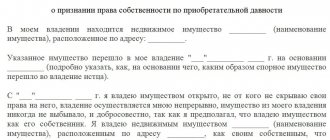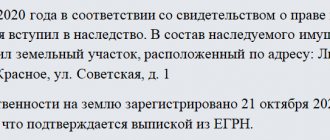Home / Land / Acquisitive prescription
The shortcomings of the legislative regulation of land legal relations in Russia have led to the fact that it is often very difficult to register plots of land that some citizens have owned for many years, and sometimes decades, in practice, having received the appropriate permission from the authorities. Therefore, the institution of acquisitive prescription provided for in the Russian Civil Code is very relevant today.
Since 2006, Russian companies and citizens have had the opportunity to have their ownership of a plot of land recognized in courts through the institution of acquisitive prescription.
Article 234 of the Civil Code states that the owner of a plot of land, who is not legally the owner of this plot, but who has owned his own land in good faith, continuously and openly for fifteen years, ultimately acquires legal ownership of this plot of land.
As follows from the provisions of the said article of the Civil Code, both Russian citizens and legal entities can be subjects of the legal institution of acquisitive prescription. Consequently, the Russian Federation as a subject of civil legal relations, as well as Russian regions and municipalities, do not have the right to become subjects of ownership rights to a plot of land through acquisitive prescription.
As a result, only private land ownership can be registered on this basis, but state or municipal property cannot.
The acquisition of plots of land by age of ownership, compared with other real estate, has a number of legal features. This is explained by the fact that, due to the prescription of ownership, only private property rights can arise, but not all plots of land can be acquired into the private ownership of organizations or individuals.
First of all, this is due to the restriction, based on the provisions of the Land Code, of the civil turnover of certain plots of land and the establishment by law of special rules in relation to them. In particular, plots of land are not subject to legal registration as private property if they are withdrawn from land circulation or are somehow limited in it.
The right of ownership to plots of land, due to the legal institution of acquisitive prescription, can be acquired for plots that formally belong to the right of ownership to some other person, or for legally ownerless land.
Conditions of acquisitive prescription
To register ownership of land, citing acquisitive prescription, five conditions must be met:
1. The duration of existence of land ownership is 15 years . This period of land ownership begins to be calculated at the moment the right holder acquires this ownership. If a plot of land can still be reclaimed from its owner by the legal owner of the land, then the period of possession begins after the expiration of the limitation period.
2. Continuity of land ownership . This condition, provided for in the Russian civil code, means that the plot of land for the entire period (that is, at least for the specified 15 years) did not leave the possession of a specific person applying for registration of ownership. Ownership of land, which appears and then ceases, does not entail the emergence of acquisitive prescription for a plot of land. The only exceptions are those cases when a plot of land was removed from legal possession against the will of its legal owner.
It is worth noting that the continuity of ownership of a plot of land is maintained when the legal owner is replaced by its legal successor (Article 234, paragraph 3 of the Civil Code of the Russian Federation). Succession to land is established in accordance with the norms of civil law. For individuals, the provisions of inheritance law are most often applied. However, there are nuances here too. Since the testator-owner of a plot of land was not the owner of this plot according to legal documents, he did not have the right to leave it under a will. Therefore, succession in this situation is possible only for heirs by law.
Based on the above norms, the actual owner of a plot of land, claiming to take ownership by virtue of the civil law institution of acquisitive prescription, in order to calculate the period of legal possession, has the right to add to the time of his possession of the plot of land the period of possession of this plot, which was exercised by his deceased relative-testator , provided that the legal heir entered into the inheritance and continued to use the land after the death of the testator.
In addition, the continuity of long-term possession is preserved when the owner of the land transfers his plot for temporary possession to a third party. 3. Possession of a plot of land is carried out by a person who is not considered the owner of the plot, as his own . This provision means that the owner of the land must extract for himself the beneficial properties of the plot of land in accordance with its purpose. For example, an owner uses a plot of land intended for gardening to grow crops for his family.
When establishing this condition for acquisitive prescription, the legislator assumes that ownership of a plot of land as one’s own means ownership not under a contract. Consequently, the provisions of Article 234 of the Russian Civil Code on acquisitive prescription should not apply in situations where ownership of land occurs as a result of contractual obligations (storage, gratuitous use, lease and other agreements).
In judicial practice, the most common case when it is possible to use the institution of acquisitive prescription to formalize ownership by the owner of land plots is the transfer of these plots by the legal owner to another person without proper legal registration.
For example, a citizen acquired a plot of land even before the Russian Land Code came into force, but a written purchase and sale agreement was not drawn up by the parties to the transaction, and registration of rights, naturally, was not carried out. The acquirer, who owned the plot, was convinced that he had bought the land because he had paid the former owner a certain amount of money, and he had vacated the corresponding plot of land. In reality, the former owner remained the formal owner of this land.
4. Openness of ownership , meaning that others should have the potential opportunity to observe this ownership of the right holder of a specific piece of land.
5. Good faith ownership of the relevant plot of land . In this case, bona fide ownership means the internal conviction of the owner of a piece of land in the legality and validity of his ownership. If the actual owner of the land knew that the plot was owned by another citizen or organization, and arbitrarily occupied this plot of land, then such possession, even if carried out for a long time, cannot be recognized as bona fide.
The procedure for registering a plot by acquisitive prescription
Recognition of the ownership rights of the owner of a plot of land due to acquisitive prescription occurs through the court.
Since the actual owner of the land does not have documents confirming the legal ownership of this land, he, according to the Russian Civil Code (Article 234), can apply to the courts to recognize his ownership rights.
Only after receiving a positive court decision in response to the corresponding statement of claim and its entry into force, does the owner of the land have grounds for state registration of the ownership of a plot of land acquired through the court due to prescription.
It should be noted that the judge’s ruling must clearly identify the plot of land. This means that from the document it is possible to accurately determine which plot of land is the object of a court order.
To do this, the decision indicates the location (address) of this plot of land, its category, area and cadastral number. If this plot of land is not yet registered in the cadastral register, then registration of ownership rights to it will be denied.
Registration procedure
When, by a court decision, it is possible to register a plot of land under the right of acquisitive prescription, you need to collect certain documents from the cadastral service, the local branch of Rosreestr, and other authorities:
- A receipt for payment of the state fee will be required. The state duty is established as a payment for many services, including the procedure for registering land ownership.
- You will also need a court decision granting the right to officially become an owner.
- Civil passport or other document that confirms identity.
- Cadastral and technical passport for a plot of land.
When registering the owner's right, you need to carefully check whether there are other applicants for the land, because they may have the same rights (in some cases).
Documents for registration of rights
To obtain a registration certificate for a plot of land acquired by virtue of the legal institution of acquisitive prescription based on a court order, the following documentation is required:
- a document confirming payment by the applicant of the registration fee in favor of the state;
- a judge’s decision that has the force of title documentation for a plot of land;
- the applicant's identity card;
- cadastral passport and other technical documents for the plot of land being registered.
The issuance of a registration certificate to the owner of the land who has taken ownership on the basis of the relevant judicial act does not prevent such registration of rights from being subsequently challenged through the court by third parties who consider themselves to be the legal owners of this plot of land.
Sample agreement for renting an apartment with the right to buy
Ways to re-register a mortgage to another person
Ways to find out who owns a plot of land
Legal features of lease with option to buy
Early repayment of a mortgage loan
Purpose and content of the cadastral plan of a land plot
Comments (188)
Marina|
2020/06/19 Hello! I have been the owner of a plot of land in a garden society for 15 years. I bought it from the previous owner without drawing up a purchase and sale agreement, they just issued a card as a member of the garden society. There is information on two previous owners of this plot, but when contacting Rosreestr through the MFC, ownership of neither of them was confirmed. Now I cannot register ownership of this plot of land, because... there is no registration in Rosreestr...Both former owners died, there are no relatives. It is unknown whether there were any other owners of this site; the documentation is only for these. What should I do? How to register ownership with the relevant documents? Thanks Sergey| 2020/09/15 Hello! Which court should I go to? At the place of residence? At the location of the cadastral or other organization? Thank you!
Popova Tatyana| 2020/10/27 The husband inherited the house in 1982, the certificate of inheritance states that the specified house with an area of 48.6 is located on a land plot with an area of 395 sq.m. An application has been written to obtain a certificate of ownership of the house and land. But the land was denied. Land tax was paid all the years.
Popova Tatyana| 2020/10/27 How to register land ownership if you have been using the land since 1968 and purchased a house on a plot of land. It is stated in the contract. Land tax was paid.
Sergey| 2020/12/01 Hello! After the death of my grandfather and grandmother, the house and the plot were left to my father and aunt, they drew up a deed of deed for me (but only the house was the property, the land was leased to my grandfather and they refused to give it to me as my father wrote a deed of deed for me. Rent I don’t want to because I think that my grandfather and father lived enough on this land. I have owned a house for 7 years, can I register the land as my property? Thank you
Christina| 2021/02/17 In 1982, there were no land ownership rights! That's why it was refused! Only to your home! Therefore, you need to register the land separately!! Take the list from Rosreestr, make a cadastral passport, etc.! Go to the organization with what you have and find out! The certificate for the house is also subject to registration in Rosreestr!
← Previous comments
What it is?
Dear readers! The article talks about typical ways to resolve legal issues, but each case is individual. If you want to find out how to solve your particular problem , contact a consultant:
This is important to know: The procedure for delimiting state ownership of land
APPLICATIONS AND CALLS ARE ACCEPTED 24/7 and 7 days a week.
It's fast and FREE !
Acquisitive prescription for a land plot is a method of obtaining the right to land when a citizen first uses the land for a long time, and then can register it as ownership.
In order to obtain a plot, you need to do the following:
- receive land from the state or municipality on the right of use;
- continuously own the land plot for 15 years;
- to use as your own in all respects;
- use it clearly for everyone;
- pay your fees conscientiously and take care of them as if they were your own.
If all these signs are present, then the owner has the right to protect his site from third parties. The fact that he uses the land is first an advantage for acquiring ownership of it, and then a right. This does not apply to cases where third parties are owners or have other grounds.
According to the law, the 15-year period of ownership of real estate includes the time of both the person who received the right of ownership from the state and his successor. For example, in the Soviet era, all land belonged to the state, and citizens were allocated plots for lifelong use with the right of inheritance.
If the citizen who received the allotment owned it for 10 years, and then his heir owned it for 5 years, then the result is 15 years. This is exactly the period required for the method of acquiring real estate ownership.







